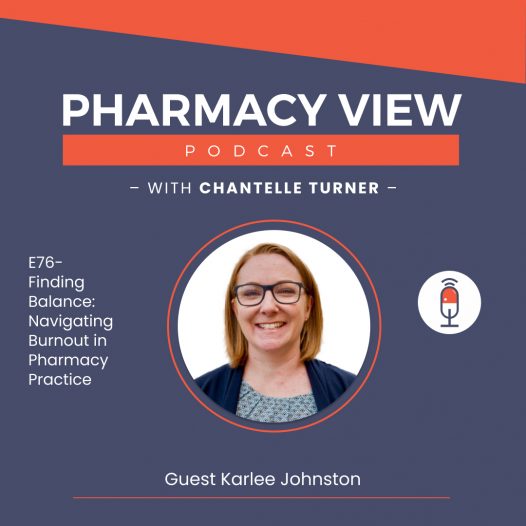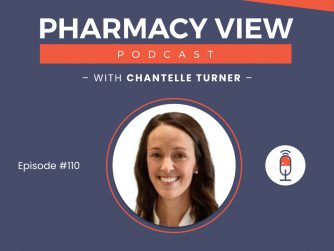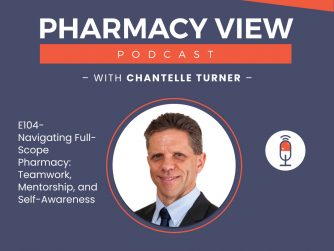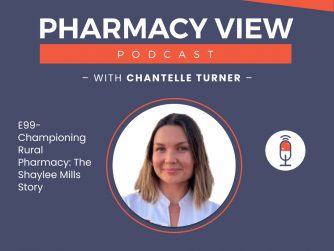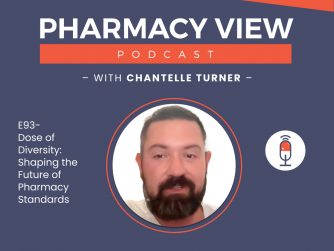In this episode of Pharmacy View Podcast’s Full Scope Pharmacy Leadership stream, host, Chantelle Turner, a Pharmacist Leadership and Business Coach at TURN Pharmacy Leadership, is joined by Karlee Johnston, Lecturer at The Australian National University. Listen in as Karlee shares their personal journey from being a success-driven Pharmacist to redefining success, discussing the impact of burnout and the importance of self-care. Discover practical strategies for effective communication, mindfulness, and finding balance in the demanding world of Pharmacy in this episode of the podcast.
Karlee begins the conversation by talking about their journey and evolution in their Pharmacy career. They discuss how their perspective on success has changed over the years, transitioning from a highly ambitious and focused individual to someone who prioritizes well-being and work-life balance. Karlee opens up about experiencing burnout and taking a significant amount of leave, which led them to explore new opportunities in academia and research. Through their interviews with other Pharmacists, especially during the COVID-19 pandemic, they gained a deep appreciation for Pharmacists in their communities. Karlee’s current focus lies in teaching, modeling, and helping pharmacists become the best versions of themselves.
Karlee opens up about their experience with burnout and the emotional toll it took on them. They describe how burnout gradually crept up on them, leading to feelings of stress, unhappiness in their job, and emotional exhaustion. Karlee shares their struggles with connecting to patients, experiencing a lack of empathy for some and overwhelming sadness for others. They also discuss the common theme they discovered while interviewing Pharmacists about burnout, which is the immense sense of duty and responsibility they feel toward their patients, teams, and communities. Karlee also discusses the sense of responsibility and denial that often accompanies burnout. They share the belief that people feel that if they could keep it together for the rest of the team, everyone would be okay, including themselves. Karlee reflects on their pride in being there for others but also acknowledges the danger of ignoring the reality of their well-being. They emphasize that seeking external validation and expecting others to fix the situation is futile. Karlee and Chantelle talk about how they are committed to providing tools and support to help others navigate burnout without reaching such extreme depths.
Karlee shares their insights on self-care and advocating for one’s needs. They emphasize the importance of taking time to understand personal needs and resources, being mindful of emotions triggered by different environments, and consciously naming and understanding those emotions. Karlee highlights the significance of being deliberate in recognizing moments of happiness and identifying the factors contributing to those positive feelings. They also stress the value of authenticity in asking for support and setting clear expectations, acknowledging that while the response may not always align with one’s needs, asking authentically is empowering.
Karlee shares insights on managing reactions and controlling behavior when faced with frustration or conflict. They emphasize giving oneself time and space to process emotions before reacting, allowing for a more thoughtful and effective response. Karlee recounts an example of a challenging work situation where they learned the value of preparing their message and having a planned conversation instead of reacting impulsively. They discuss the significance of acknowledging emotions while controlling behavior and discerning when a conversation is necessary or when it’s better to let go.
Karlee explains how they manage emotional burdens and take time to unpack and process their emotions. They highlight the importance of journaling as a tool for emotional release and reflection, emphasizing that it doesn’t have to make perfect sense but serves as a therapeutic outlet. Karlee also explores the significance of spending time alone and engaging in self-reflection, sharing their experiences of finding quiet moments to connect with themselves and reframe “doing nothing” as valuable self-care. By creating space for themself, Karlee finds relief and empties their emotional backpack.
Karlee reflects on their evolving perspective on success and their value shift. Previously, they sought external validation to be recognized as the best in their field, particularly in critical care Pharmacy. However, their definition of success has transformed. While they still value the opinions of others, they now prioritize their integrity and how they show up in the world. It is no longer solely about the achievements but rather about how they conduct themselves.
Karlee emphasizes that when you ask in a way that is heard and understood, you are more likely to receive the support and assistance you require. Karlee believes people genuinely want to help and uplift others, even though it may not always feel that way. The ability to effectively communicate your needs can lead to amazing outcomes.
Topics Covered
- Transition from being ambitious and success-driven to redefining success
- Experience with burnout and its impact on personal and professional life
- Recognizing the importance of self-care and understanding one’s needs
- The challenge of asking for help and seeking external validation
- Strategies for effective communication and being heard
- Practicing mindfulness and emotional self-awareness
- Finding balance and creating space for oneself
- Overcoming fear and self-doubt in expressing needs and boundaries
- The power of authenticity and self-advocacy
Key Quotes (Time Stamps)
- “I’m very ambitious and very end game-focused individual, and I have approached my career in that way. So, I spent most of my hospital career—I’ve been a hospital Pharmacist since I finished Pharmacy school and I have really focused on becoming a critical care Pharmacist. So, I’ve done that, and I’ve got advanced practice. And so that ambition, that very end focus, was a very big part of my career, what I thought was career success. What success looks like to me now is very different from what it looked like to me even five years ago.” (2:23 – 3:11)
- “So, I took some time off and realized I had burnout. And when I started talking to colleagues about my experience, I found out that it wasn’t just me; quite a few of my colleagues have felt or were feeling similar to the way I was. And so, I decided to research it. And that, I guess, was the beginning of me moving into an academic position.” (4:05 – 4:28)
- “I got to interview a lot of Pharmacists about their experiences working, particularly during COVID. And I realized quickly that the pride I had in the way that Pharmacists represent their communities was very, very deep. And that appreciation for that privileged role we have in people’s lives has become more and more a part of what success looks and feels like to me. And so, my main interest now is talking about teaching, modeling, and how to be the best version of ourselves so that we can be the best Pharmacists that we can be.” (5:07 – 5:51)
- “As you know, most of my work is in ICU, and I found myself almost on two ends of the spectrum. Almost where some patients I just couldn’t connect with; the empathy wasn’t there for some of those stories. And on the other hand, I felt this deep, empathetic, almost sympathetic connection with other patients that had me really feeling their sadness; that was heavier than it had been for me previously. And I guess I was feeling very taken advantage of, uncared for in my job. I was resentful of all the work that I was being asked to do, and nobody was helping me. I had this sense that I was at it alone.” (7:40 – 8:31)
- “One of the key things I’ve learned about burnout, both from interviewing Pharmacists and just my own experience, is that Pharmacists feel an immense sense of duty. So, we feel this overwhelming sense to be there for others.” (8:39 – 8:57)
- “We often get a sense of pride and feeling good about being there for other people. And I think when you’re in that kind of space, you really looking for those connections, you’re really seeking out how can this work that I how can I be better? And I think it’s an easy way to ignore or to push aside the reality of what’s really happened.” (11:43 – 12:06)
- “I think the whole point of seeking external validation is to be seen, to feel seen. When you’re feeling unseen or unvalued, there’s almost nothing anybody else can do to help you feel as seen as you feel you need to be.” (13:37 – 14:00)
- “I was very, very sad. I was very, very angry. I felt really taken advantage of. But I realize now that I did not ask for help. I did not ask for stuff. I did not ask for time off, and I didn’t think I could. There were times when I didn’t know what I needed.” (14:59 – 15:22)
- “Actually, knowing what you need is hard. It’s actually a hard thing to really understand your needs, especially when you’re hurting. And to ask for something is even harder.” (15:23 – 15:39)
- “I’m a lot more deliberate about how I’m feeling in different situations. And so, then I know when I’m not okay, one, what might it take to make me feel a bit better.” (18:40 – 18:51)
- “I think if you can be kind and curious and authentic, as a general rule, people find it really hard, one, to say no to you and two, to be mean to you.” (23:14 – 23:28)
- “Now, I very rarely react in the moment. And even though it is a lot of work for me, I deliberately have to tell myself—do not react to this; you can feel how you feel but do not react to it; you can think about this later and how you are doing to react later.” (25:13 – 25:33)
- “Giving yourself some time and space will change not just the way you react but the message and how it is heard.” (25:37 – 25:43)
- “I think there’s a lot of guilt associated with doing nothing. And I think when we reframe that and say, actually, this is work, it’s work for me to sit and have a chat to myself. I think just that reframing can be really helpful. And that has helped.” (33:23 – 33:43)
- “There is a lot of power in being able to see and understand how you feel; a lot of power. And it influences your behavior. If you can see and understand it, you can—you can’t necessarily change it, but you can certainly influence it.” (37:23 – 37:41)
- “When you ask for what you need in a way that is heard, you almost always get it. People want to help you. They’re not trying to push you down. They’re trying to lift you, even though sometimes it feels like that, they’re not. And if you can ask for what you need in a way that can be heard, it’s amazing.” (40:07 – 40:27)
Social Media Clips (Time Stamps)
- From ambition to balance: Karlee Johnston’s journey in Pharmacy (2:07 – 5:51)
- The silent onset of burnout (6:31 – 9:53)
- The burden of responsibility and the tools for resilience (9:55 – 12:06)
- The quest for external validation (13:18 – 16:02)
- Understanding your needs, practicing emotional mindfulness, and being authentic (16:43 – 20:31)
- The Art of Asking: Practice Makes Perfect (20:41 – 23:26)
- Crafting conversations: lessons in message preparation (23:40 – 28:11)
- Unpacking emotions and getting the release (29:08 – 33:57)
- Leadership of self and redefining success (35:02 – 36:59)
- Karlee’s tool of choice for the leadership toolbox (39: 37 – 40:27)
Useful Links
The Australian National University | LinkedIn
Turn Pharmacy Leadership | LinkedIn
Turn Pharmacy Leadership | Website
Email: cs.turner@bigpond.com
Attain Pty Ltd – Home (iattain.com.au)
Scott Carpenter, EVBC | LinkedIn
Shopfront Solutions: Overview | LinkedIn
Aerion Technologies: Overview | LinkedIn
Aerion Technologies | Helping Non-Techs Build Better Tech


